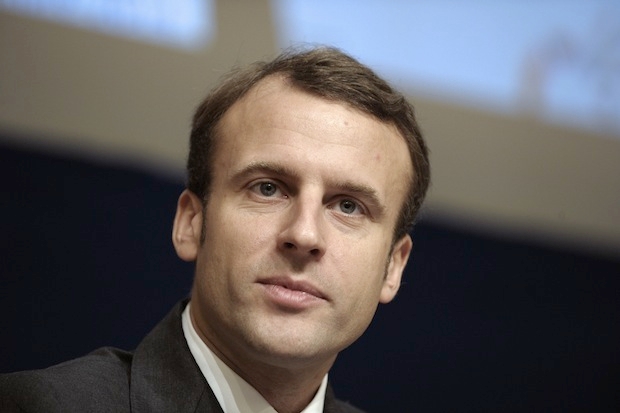Emmanuel Macron has only been the French economy minister for a few months, but already he’s attracted plenty of domestic outrage, mostly from socialists who think he’s a bit too right-wing. Now the former banker seems to be aiming for a wider audience to provoke, suggesting in meetings in London yesterday that Germany should drop its opposition to using the European Stability Mechanism bailout fund as a EU-wide stimulus fund.
Macron spoke to British journalists after holding meetings with Vince Cable and Chuka Umunna. He will also meet Osborne during his trip, and hopes to persuade the Chancellor of the merits of using €50bn from the ESM to spend on capital projects across Europe. He argued that without investment, France would see a situation akin to Portugal, where the country implemented supply-side reforms but has not seen growth since its bailout. ‘We didn’t properly invest there,’ he said.
‘What I know is that our reforms will be difficult to be voted, and to be implemented: it is our duty to do so and we are ready to so. We are 100 per cent convinced that this is the right direction and 100 per cent dedicated to the job.
‘If we want to find the relevant political and economic bargain, we need the demand side push.’
His attitude towards Germany’s current opposition is essentially ‘if you don’t ask, you don’t get’: he said ‘I think if you do not propose anything, it’s never realistic to gain something’.
Macron’s reforms are going to be difficult for France to swallow: a longer working week, deregulation, making it easier for firms to let go of people and the government dictating Sunday opening hours. He is in negotiations with the unions, but many French Socialists are disappointed with what he wants to do. When he was setting out his reforms, in a half-hour-long soliloquy that he produced in response to one short question at the briefing, Macron didn’t just make clear that he was no ordinary socialist, but that ordinary socialism is, as far as he’s concerned, now pointless. He said it was ‘impossible to be a classical socialist’ who believed in increasing the size of the state through tax and spending, and that even though that ‘is a little bit uncomfortable for some people’, the task for Socialist politicians today was to work out how to get the society they wanted without resorting to their traditional policies. He was neatly illustrating James’s point in last week’s magazine about the crisis for the Left.
Macron’s priority is to regain trust in the French government and the French economy by making it easier for entrepreneurs to thrive in the country and reforming the economy as described above. But he was adamant that investment across Europe would complete those reforms – and that Britain’s future was in Europe, arguing that ‘I don’t see how it can be rational to leave’. Given his own political tribe is uncomfortable with many of his reforms, Germany is uncomfortable with his plan for the ESM, and Brits don’t like being lectured by the French about their EU membership, Macron is clearly keen for the opposite of a quiet life as a minister.







Comments